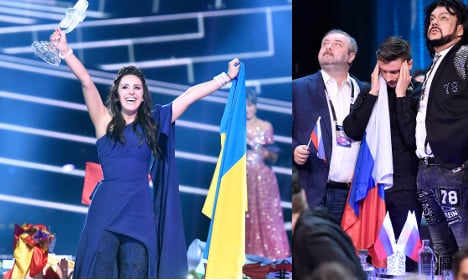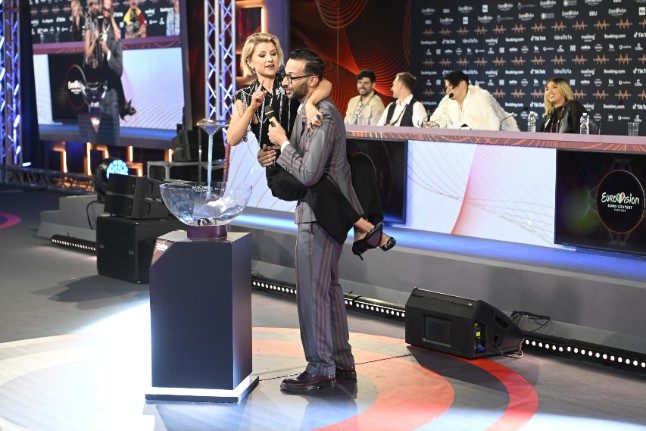“Yes!!!” Ukrainian President Petro Poroshenko tweeted.
“An unbelievable performance and victory! All of Ukraine gives you its heartfelt thanks, Jamala.”
Prime Minister Volodymyr Groysman tweeted his congratulations, adding “glory to Ukraine!”
The 32-year-old winner is a member of the Muslim Tatar minority of Crimea who saw her great-grandmother deported along with 240,000 others by Stalin in the penultimate year of World War II.
Jamala's poignant song opens with the harrowing line: “When strangers are coming, they come to your house, they kill you all and say, 'we?re not guilty, not guilty'.”
But the memories of that horror have been revived by Russia's seizure of Crimea several weeks after a pro-EU revolt ousted Ukraine's Moscow-backed president in February 2014.
However, Russian lawmakers on Sunday lashed out at arch-rival Ukraine's “political” victory in the Eurovision song contest, as one pro-Kremlin paper insisted Moscow's entrant was robbed.
Ukrainian performer Jamala won the glitzy contest Saturday with her ballad “1944” about the deportation of the Crimean Tatars by Soviet authorities during World War II in a performance widely seen as a swipe at Moscow over its annexation of the peninsula in 2014.
Russian singer Sergei Lazarev — the clear favourite with bookmakers before the contest — was beaten into third place after losing out on the national jury tallies despite claiming the most points from viewers in the public vote.
“It was not the Ukrainian singer Jamala and her song 1944 that won the Eurovision 2016, it was politics that beat art,” Russian senator Frants Klintsevich told Russian newswires, calling for Russia to possibly skip next year's tournament in Ukraine.
Russia and Ukraine have been locked in a bitter feud since Moscow annexed Crimea in February 2014 and was then accused of fuelling a bloody separatist uprising in the east of the country.
The crisis in Ukraine has pushed ties between Russia and the West to their lowest point since the end of the Cold War.
The head of the foreign affairs committee in Russia's upper chamber Konstantin Kochachev insisted that “according to the tally of points it was geopolitics that gained the upperhand.”
Kochachev said that the Eurovision victory could embolden Ukraine's pro-Western leadership and see an already stuttering peace process to end the conflict in the east jeopardised even further.
“For that reason Ukraine lost. And not only its long-suffering budget,” he wrote on Facebook.
“The thing the country needs now as much as air is peace. But war won.”
Mass-circulation tabloid Komsomolskaya Pravda ran an online article entitled “How the European jury stole victory from Lazarev”.
The outlet called for the results to be reviewed because of the “political” content of Jamala's song and warned gay spectators they face a rough reception in Ukraine next year.
“It became obvious that this is an entirely political story — as we won first place in the public vote that was meant to counterbalance the juries.”
Russia had earlier protested Ukraine's entry in the contest because of its “political” subtext — a violation of the contest's rules.
But Eurovision ruled that Jamala was “historical” in nature and allowed her song “1944” to compete.
One of the 2014 revolution's leaders wrote that it would be fitting for Ukraine — which will host the event next year thanks to Jamala's win — to stage the contest in Crimea itself.
“Justice would be served if the next Eurovision is held in Jamala's historical homeland — Ukraine's Crimea,” Mustafa Nayyem tweeted.



 Please whitelist us to continue reading.
Please whitelist us to continue reading.